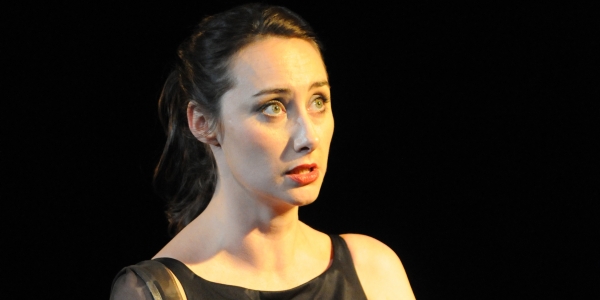“In this show you change one element and everything changes,” Katie continues. “There are ramifications throughout the whole play, in a good way. It’s amazing how well the change of gender works in this play, it’s really interesting.” There is nothing more Shakespearian than playing around with genders and this production throws in a biggie. “It’s a man’s play,” Katie confesses. “So when I heard they were auditioning, it didn’t really jump out at me as something to do, as it’s just so male dominated. But I thought I’m going for Portia, she has one of the most amazing female speeches in all his plays, and I could do that for six months if I got it. Then I found out there was a female Cassius, actress Kate Mulvany playing the villain. Normally it’s a male villain and I thought ‘That is interesting.” As it also puts a twist on my character as well. I’d like to play with that.” And play she does. “A lot of elements to play with in Peter’s [Director Peter Evans] directing, which has dramatically changed the way which I play my character, compared to the traditional ways of playing her. We have a very sparse stage, not props to play with or hinder you, it is very clean, there is only you on stage so you can’t hide behind anything, a minimal set. So we are honing in on the language, which is fantastic. My character, Portia was the largest female part in the play but with a female Cassius every thing is changed. Portia was one of the most intelligent women of her time, she had to convince her husband to spill his secrets and because there is now a female Cassius it changes Portia. She is no longer the strongest female in the world; I have to approach it in a completely new way. She can’t use sexual politics, which is how a lot of people play it, that no longer works and is really, a bit thin. So you get to see something new.”
Signing up for a six-month tour requires a love of your fellow cast members, something Katie has in spades. “Just wait until till you see Caesar, he’s not your typical stoic Caesar,” Katie enthuses. “He’s human, which I’ve never seen before, he doesn’t have to show power. Played by Alex Menglet, who’s Russian, he is just very human and lovable, which is a rarity for Caesar, which is perfect because you understand why the people love him. And Daniel Frederiksen playing Antony! Usually played by a big, brawny alpha male, the warrior, the stud, and even though Daniel is handsome and gorgeous looking, he more of your chariots of fire sort of Antony rather than Conan the Barbarian. He is a rascal, cheeky, which fits perfectly with his speeches.”
With the main conspirator of the play now a woman and the title character literally knifed in the back, it’s hard not to have your thoughts wonder to a certain redhead who is currently a hairs breadth away from her own downfall. “It really shows what happens when you lose your way, when you lose the confidence of the people,” Katie concedes. “You see demise and backstabbing. Unfortunately we haven’t learnt – when you think of Julia Gillard and Kevin Rudd, which is just a tiny little seed of what the play Julius Caesar is talking about. It’s more about what’s going on all over the world, in North Africa, with Tunisia and Libya and all those countries. Probably a bit more poignant than the toppling of just one power. It is bigger than just one incident. There is one scene that calls to mind the riots in London, where the people burn all the conspirators houses, you look at it and think “My God, this is what the people are doing,’ the Greeks and Shakespeare never go out of date.”
Kate Mulvany worked on the script with Peter Evans for some nine odd months to get it into touring shape, as in addition to swapping genders there was an issue of cast size.”Because it’s a touring show we can have only ten actors, and the original character list is forty, she had to do some cutting,” Katie says.” Also she has changed the ending. Significantly. Caesar still dies. Usually the second half is laden with wars, it is really quite had to trudge through as an actor and more importantly as an audience because it becomes about the mechanics of plot rather than characters, and I believe characters are Shakespeare’s forte. Normally most people get lost, so she cut out the wars and brought in the original source, Plutarch (a Greek Historian who first documented Caesar around 11AD). The end now is cynical but it puts it all into context looking at humans, as they are now, us at this point in history.”







